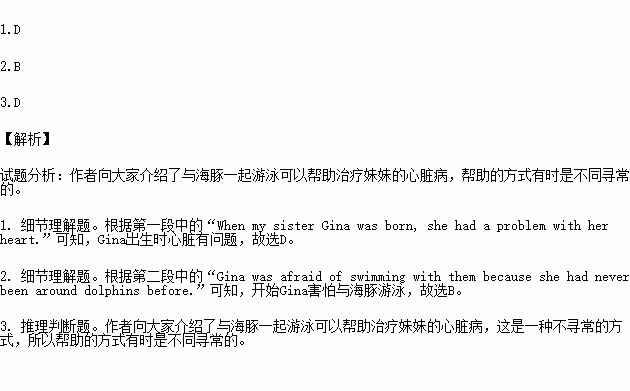题目内容
When my sister Gina was born, she had a problem with her heart. Her heart was pretty bad in the beginning and she stayed in the hospital for a month. The first few years were very difficult because she was very sick. She had five operations before she was three years old. She had trouble walking, playing with other children, and going to school.
Although Gina couldn’t laugh and talk, we all knew that she just needed love and care. Our parents wanted to take Gina to a special place in Florida where she could swim with dolphins. Gina was afraid of swimming with them because she had never been around dolphins before. We had also never traveled that far as a family.
When we got to Florida, we saw where the dolphins lived. It was a place where kids with special needs like Gina could come and spend time. I thought it was going to be a vacation, but it wasn’t. Gina had to work hard every day for a week.
The trip was amazing .Gina laughed and clapped(拍手) when she saw the dolphin, and the dolphin splashed (溅起水花) when it saw Gina. They swam together all day. Gina was able to move her body more than she normally did at home. Mom and dad were proud of Gina. I was, too.
1.We know from the text that Gina ________.
A.experienced five operations in a month
B.got along well with other children
C. stayed in the hospital before three
D. was born with a heart disease
2.How did Gina feel about swimming with dolphins at first?
A.ExcitedB.FrightenedC.AngryD.Proud
3.The text is written to tell us that ________.
A.learning to walk is hard work
B.dolphins can treat many illness
C.families should travel together often
D.help sometimes comes in unusual form
 阅读快车系列答案
阅读快车系列答案
